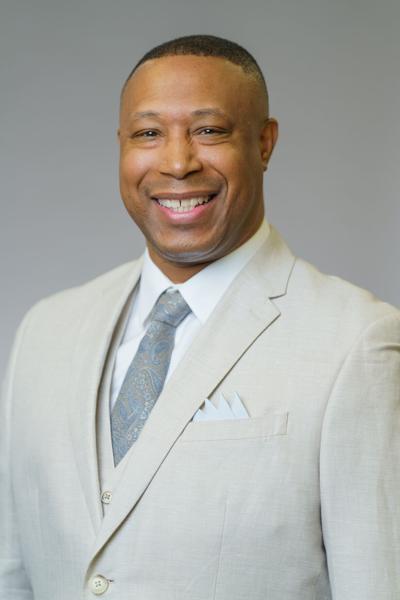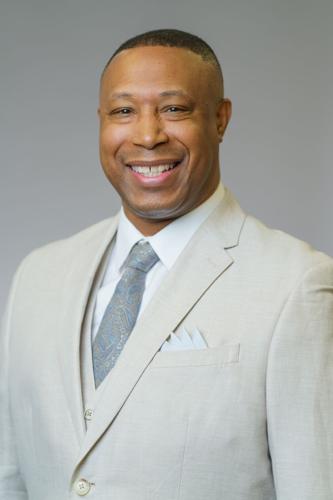Dr. Michael Celestin Jr. is native New Orleanian. Celestin is the director of the Louisiana Tobacco Control Initiative, an assistant professor at the LSU New Orleans School of Public Health and a father and husband.
Celestin graduated from the University of Louisiana at Lafayette with a bachelor's degree in arts in communication, a master's in arts in health promotion from the University of New Orleans, a doctorate in public policy with a concentration in health policy from Southern University in Baton Rouge and a master's of science in clinical research from Tulane University.
Celestin has researched, studied and taught about Louisiana and the Deep South's relationship with tobacco-related illnesses, diseases and deaths.
His previous research looks at tobacco illness disparities between gender, race and location in the Deep South and Louisiana. His latest research focuses on using a phone-call program as intervention for pregnant and postpartum smokers to help them quit.
How did you find the medical field and clinical research?
When I graduated from UL in communication, I thought I would be a speechwriter for some reason. No clue why.
My first job was with the Stanley Scott Cancer Center in New Orleans to help health care professionals improve their screening and treatment of tobacco use. I think that was really my connection to what I do now.
My mentor, Dr. Sarah Moddy Thomas, was the person who brought me into the health care space. She saw something in my resume, saw something in me, and I've been doing this same work since.
Tell me about your statewide research on tobacco cessation with pregnant and postpartum smokers.
The project was designed to develop an intervention to help pregnant and postpartum smokers quit. We first interviewed pregnant and postpartum smokers, and we found that they were unaware of services that were available to them, but they wanted to quit. Their spouses or family members, we found, play critical roles in supporting them to quit.
Five-minute mindfulness exercises in the program over the phone would help them handle stress related to smoking, quitting, being a first-time mother or raising families.
If they were interested in talking to a tobacco treatment specialist, they could be transferred over to the Louisiana quit line. We're still working on that.
How does the phone-line program work?
When a person goes into a clinic, their health care professional should triage them for their height, weight and blood pressure. They should also ask them about tobacco use. If they use tobacco, this program would augment their care.
A health care professional should advise you to quit smoking, and then what we would like for them to do is enroll them into the IVR (Interactive Voice Response) intervention.
The IVR system would help free up time for the health care professional and extend care for the patient beyond just that clinical visit.
The program will ask them about their tobacco use. If they still smoke, it will motivate them to quit. If they don't smoke anymore, it will motivate them to remain abstinent. If they are a tobacco user and they want to talk to someone, it will transfer them to the quit line. If they want to listen to mindfulness exercises, it will allow them to repeat those exercises however many times they want.
Have you found that tobacco use is more prevalent in Louisiana with pregnant and postpartum women?
We have higher rates than the national average of tobacco use among women before, during and after pregnancy. Louisiana is much higher than national averages across the board. It doesn't matter if it's gender, race, geographical location.
What are some innovative techniques and technologies about tobacco prevention or cessation that you're excited about in the future?
What I'm really looking at moving forward, is how to reach people at the right time with the right message, so that it can engage them and motivate them to quit.
I'm interested in understanding more about how to communicate risk and how to communicate the availability of services that patients can take advantage of. Behavior change is hard. It takes reminders.
How do education and knowledge of services help and/or hinder the progress of your research?
Just because you build it, doesn't mean they will come.
People just need to be reminded about services that are available. Health care professionals need to be reminded to treat their patients. When patients, especially smoking patients, come through hospitals or clinics, health professionals concentrate on the acute health problem.
Smoking is the number one preventable cause of disability, disease and death. It's important for health care professionals to remember to talk about it at every visit, and remind patients that cessation services are available whenever they're ready to quit.
As LSU’s YEAR Teacher of the Year, do you have any departing wisdom for prospective researchers in this medical field?
I've been mentoring for about seven years. I'm always trying to mentor the next generation of scientists. My tip is: Always stay ahead of the curve.
Look at what funding agencies are interested in. I always remind them to build upon what's already happened by being innovative in their approach.
This interview has been edited for length and clarity.




























